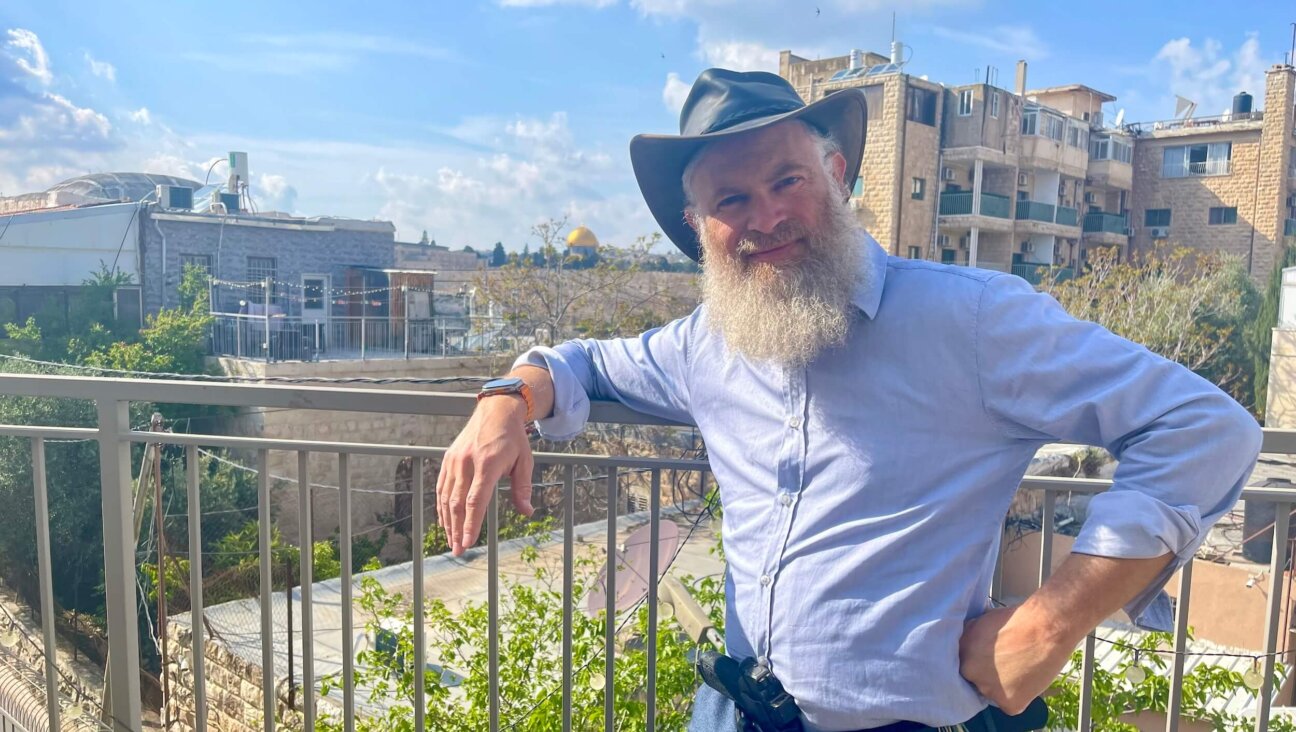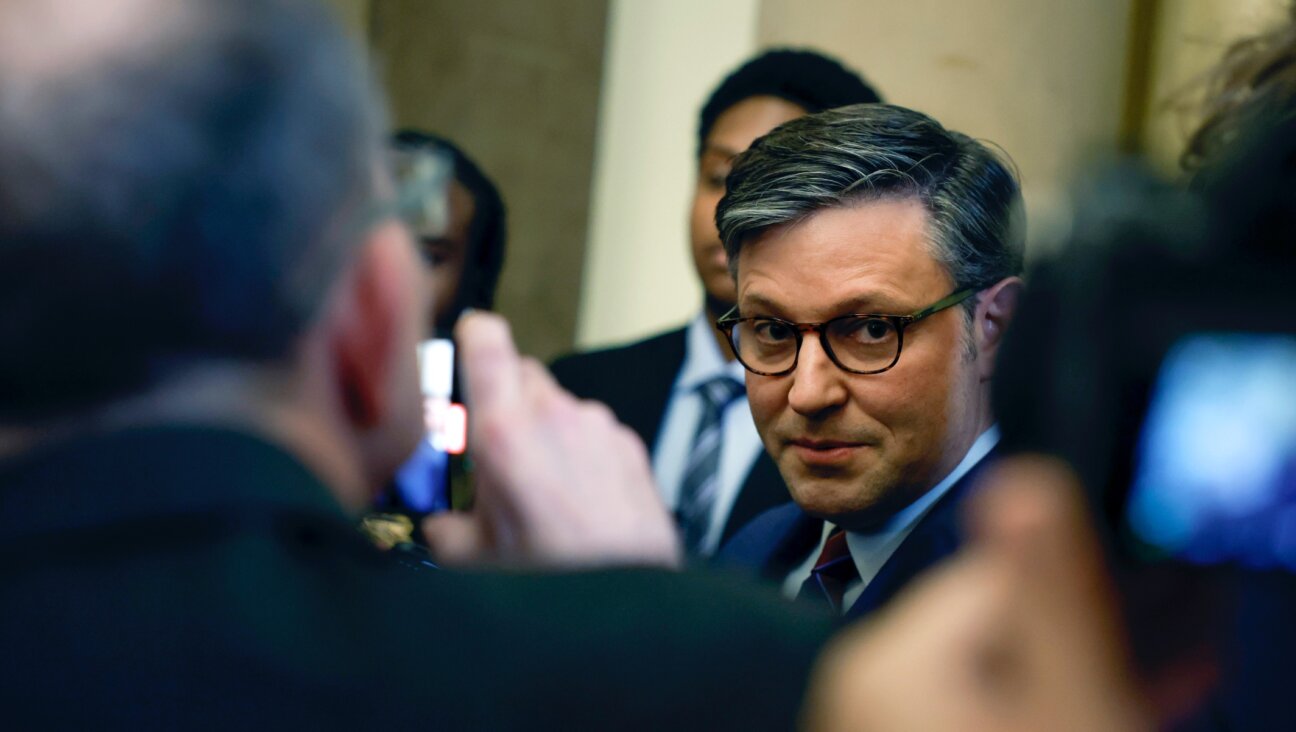Controversial Imams Enter Dialogue With Rabbis
Some of the most influential and controversial Islamic clerics in the Middle East are participating in a plan to launch what organizers describe as the first joint-training institute to produce future moderate sheiks, rabbis, priests and ministers.
The unprecedented proposal to create a summer religious institute — where young seminarians from the three faiths would study together to break down barriers and foster positive relationships — was unveiled this week during a nine-day “Summit for Interfaith Respect,” held in New York City and in Boston.
Partially funded by the U.S. Department of State, the interfaith summit assembled Catholic, Greek Orthodox, Protestant, Islamic and Jewish religious leaders from around the world to study biblical texts and begin planning for the joint-training institute. The group spent Tuesday at the Jewish Theological Seminary, the flagship institution of Conservative Judaism, interpreting and debating the Jewish, Muslim and Christian versions of the story of Abraham’s binding of Isaac.
Organizers, including Stephen P. Cohen, president of the Washington-based Institute for Middle East Peace and Development, are hailing the initiative as a vital step toward bridging gaps between the West and the Islamic world. Jewish participants included several members of the JTS faculty; Orthodox rabbi and Brooklyn College professor David Berger, and Rabbi Reuven Firestone, a professor of medieval Judaism and Islam at the Los Angeles campus of the Reform movement’s Hebrew Union College-Jewish Institute of Religion.
“This is a very important moment for leading religious figures from the Middle East and the United States to come together,” Cohen said in a welcoming statement Tuesday. Cohen, a private citizen who has spent much of the past two decades shuttling between Arab, American and Israeli officials in an effort to promote peace, said, “The tensions that currently characterize relations among many nations and religious communities require high-level discussion about ways to advance respect and understanding across faiths.”
But criticism of the summit’s guest list, specifically several Islamic clerics who have endorsed suicide bombings, is highlighting the political pitfalls and moral dilemmas facing the architects of such efforts. In particular, the participation of two controversial Egyptian Islamic scholars — Ahmed Al-Tayeb, a former Egyptian grand mufti, and Sheik Dr. Muhammad Sayyid Tantawi, perhaps the highest-ranking theologian in Sunni Islam — is drawing criticism in some Jewish communal circles.
“If they condone the murder of Israeli civilians saying suicide bombing is legitimate, they are not the kind of people that should be involved in a dialogue,” said Yehudit Barsky, director of the department of counter-terrorism at the American Jewish Committee.
Barsky said that organizers should require Al-Tayeb and Tantawi to publicly denounce their position on suicide bombings in order to participate. “I hope we are not willfully closing our eyes because we want to see something happen,” with the training institute, Barsky said. Referring to some Islamic clerics, she added: “I would be very cautious in choosing whom to speak. There’s a [duplicity] here that the organizers might not appreciate.”
In March 2003, Al-Tayeb, the current president of Cairo’s Al-Azhar University, said that “martyrdom operations” against Israel are “100% legitimate.” One year earlier, he ruled that Palestinians who carry out suicide operations in the occupied territories are regarded by God as “a martyr” and “even rises to the highest level of martyrdom.” Last year, he urged Muslims all over the world “to take up jihad against the invading forces.”
Tantawi, Grand Imam of the flagship Al Azhar mosque in Cairo, proclaimed in 2002 that suicide bombings against Israel are valid under Islamic law and denied there were remains of King Solomon’s Jewish Temple underneath the Al-Aqsa mosque, Jerusalem’s Temple Mount, according to Egypt’s MENA state news agency. Since then, he has issued conflicting statements on the issue, including a November 2003 declaration that Muslim suicide attacks could not be justified.
Criticism of the clerics was dismissed by summit co-organizer Margaret Cone, who argued that past controversial statements made by the Islamic religious leaders no longer are relevant. “We have to move beyond that,” said Cone, a Catholic activist and Washington lobbyist. “I know and expect critics are going to bring it up and do Google searches and smear them. It’s not productive. They know what they said, and came to a Jewish seminary and a synagogue anyway. It takes guts to do what they’ve done.”
Organizers complained that leading Palestinian clerics could not attend the summit because Israel would not grant them visas. Jewish leaders and seminaries from Israel also were absent.
Some Middle East participants expressed skepticism about the project. Ambassador Sallama Shaker, Egypt’s assistant minister of Foreign Affairs, complained that the group was spending too much time interpreting and debating texts from the Torah, Koran and the New Testament and not enough time dealing with practical issues of religious hatred and violence.
Al-Tayeb said that the Koran rejects discussing Islamic theology with followers of other faiths, echoing a common Orthodox Jewish position on interfaith dialogue. Instead, Al-Tayeb suggested that dialogue should focus on social issues on which the faiths can cooperate, such as poverty and homelessness.
In addition to studying texts, the group of about 35 scholars also discussed ways that religion can become a force for peace and reconciliation.
Cohen said that the Vatican already has given its full support for the project. He also wants future meetings to include the Shia seminaries of Qom and Najaf, respectively located in Iran and Iraq, as well as Muslims from South and Southeast Asia and from Africa.
“There now exists a rare opportunity, where the governments of the United States, Egypt, Jordan and Israel are officially and formally supporting the climate for a dialogue between the world’s religions,” Cohen stated in his summit proposal. “Leading Muslim educators and scholars have now agreed to visit the United States for the first time, to initiate a process of dialogue, education, conflict resolution and religious respect.”
Cohen said that the long-term goal of the summit is to create “an alliance of young moderates in the religious sphere” to develop an ongoing dialogue. “Such efforts will have the effect of decreasing fear, suspicion and intolerance.”

I hope you appreciated this article. Before you go, I’d like to ask you to please support the Forward’s award-winning journalism this Passover.
In this age of misinformation, our work is needed like never before. We report on the news that matters most to American Jews, driven by truth, not ideology.
At a time when newsrooms are closing or cutting back, the Forward has removed its paywall. That means for the first time in our 126-year history, Forward journalism is free to everyone, everywhere. With an ongoing war, rising antisemitism, and a flood of disinformation that may affect the upcoming election, we believe that free and open access to Jewish journalism is imperative.
Readers like you make it all possible. Right now, we’re in the middle of our Passover Pledge Drive and we need 500 people to step up and make a gift to sustain our trustworthy, independent journalism.
Make a gift of any size and become a Forward member today. You’ll support our mission to tell the American Jewish story fully and fairly.
— Rachel Fishman Feddersen, Publisher and CEO
Join our mission to tell the Jewish story fully and fairly.
Our Goal: 500 gifts during our Passover Pledge Drive!
























